爱默生NATURE英文
nature的意思用法总结
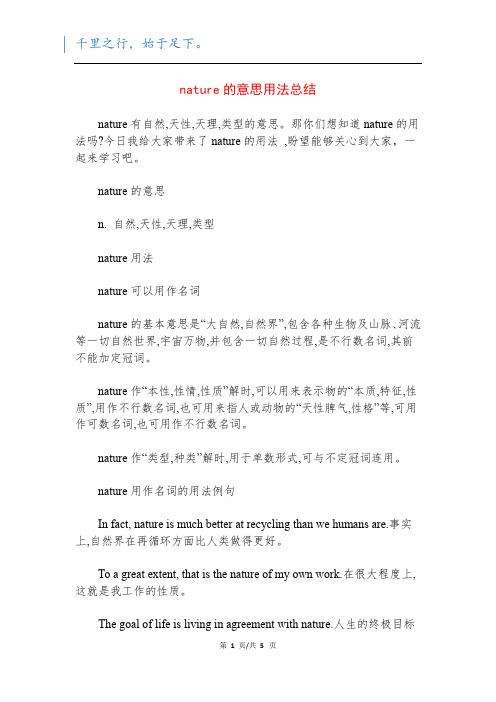
nature的意思用法总结nature有自然,天性,天理,类型的意思。
那你们想知道nature的用法吗?今日我给大家带来了nature的用法,盼望能够关心到大家,一起来学习吧。
nature的意思n. 自然,天性,天理,类型nature用法nature可以用作名词nature的基本意思是“大自然,自然界”,包含各种生物及山脉、河流等一切自然世界,宇宙万物,并包含一切自然过程,是不行数名词,其前不能加定冠词。
nature作“本性,性情,性质”解时,可以用来表示物的“本质,特征,性质”,用作不行数名词,也可用来指人或动物的“天性脾气,性格”等,可用作可数名词,也可用作不行数名词。
nature作“类型,种类”解时,用于单数形式,可与不定冠词连用。
nature用作名词的用法例句In fact, nature is much better at recycling than we humans are.事实上,自然界在再循环方面比人类做得更好。
To a great extent, that is the nature of my own work.在很大程度上,这就是我工作的性质。
The goal of life is living in agreement with nature.人生的终极目标是和自然和谐相处。
nature用法例句1、The nature of the polymer is currently a trade secret.这一聚合物的性质目前是个商业机密。
2、The most amazing thing about nature is its infinite variety.大自然最让人赞叹的是它的无限多样性。
3、Rowe does a very clever riff on the nature of prejudice.罗就偏见的本质讲了一番很精辟的话。
nature词组| 习惯用语in nature 本质上,事实上human nature 人性;人类本性by nature 天生地;生性nature reserve n. 自然爱护区second nature 其次天性;老习惯true nature 本性in the nature of 具有…性质mother nature 大自然;自然的力气back to nature 回归自然(牧场物语)beauty of nature 漂亮的大自然,自然美good nature n. 脾气好;温厚law of nature 自然法则;自然定律against nature 违反自然地;奇迹般地all nature [US口语]人人,万物physical nature 物理性质nature protection 自然爱护dual nature 二重性,双重性sounds of nature 天籁;大自然的声音balance of nature 生态平衡;自然平衡;自然生态平衡;自然均衡nature conservation 自然爱护;自然保育;自然保持nature英语例句库1.Our purpose is not only to conquer nature but also to remake nature.我们的目的不仅要制服自然,而且还要改造自然。
爱默生 nature读后感

爱默生 nature读后感英文回答:Nature is a philosophical essay written by Ralph Waldo Emerson. In this essay, Emerson explores the concept of nature and its relationship with humanity. He argues that nature is a source of inspiration and spiritual enlightenment.Emerson begins the essay by stating that nature is a reflection of the divine and that it is a source of truth and beauty. He believes that by immersing ourselves in nature, we can gain a deeper understanding of ourselves and the world around us. Nature, according to Emerson, is a teacher that can guide us towards a more fulfilling and meaningful life.One of the main themes in Nature is the idea of self-reliance. Emerson encourages individuals to trust their own instincts and intuition, rather than relying on societalnorms and expectations. He believes that by connecting with nature, we can tap into our own inner wisdom and live authentically.Emerson also emphasizes the importance of solitude and contemplation. He argues that spending time alone in nature allows us to reconnect with our true selves and find inner peace. In the hustle and bustle of modern life, it is easy to lose touch with our own thoughts and emotions. Nature provides a sanctuary where we can escape from the noise and distractions of the world and find solace in silence.Furthermore, Emerson highlights the interconnectedness of all living beings. He believes that every part of nature is connected and that humans are part of a larger web of life. This interconnectedness should inspire us to treat nature with respect and care. Emerson urges us to see ourselves as stewards of the Earth, responsible for preserving its beauty and harmony.In conclusion, Nature by Ralph Waldo Emerson is a thought-provoking essay that explores the significance ofnature in our lives. Through his eloquent writing, Emerson urges us to reconnect with nature, trust our own instincts, and live authentically. By immersing ourselves in nature,we can find inspiration, wisdom, and a deeper understanding of ourselves and the world around us.中文回答:《自然》是拉尔夫·沃尔多·爱默生所写的一篇哲学性的文章。
Nature
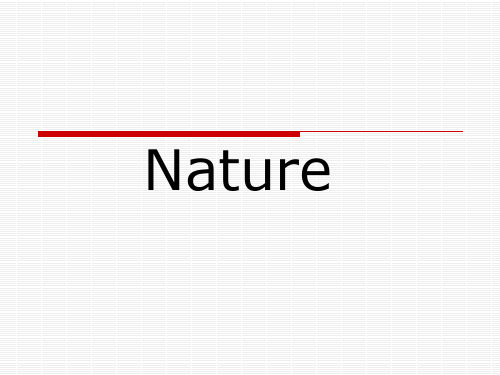
11. Standing on the bare ground, -my head bathed by the blither air and uplifted into infinite space, --all mean egotism vanishes. I become a transparent eyeball;I am nothing; I see all; the currents of the Universal Being circulate throughme; I am part or particle of God;我站在空地上,头沐浴在和煦的空气里,仰望着 渺邈无垠的太空,小我的一切都消失了。我变成一只透 明的眼球;本身不复存在;我洞察一切;“上帝”的精 气在我的周身循环;我成为上帝的一部分。这是表现爱 默生的超验主义和神秘主义思想的警句名言,多为后人 援引。"Universal Being" 可做"上帝"解,亦同后来他 讲的"超灵"。
5. Philosophically considered, the universe is composed of Nature and the Soul: 从哲学角度考 虑,宇宙由自然界和精神组成。本句为爱默生唯心主义 超验论的名言。”the soul”有“超灵”、“圣灵”的 意蕴,泛指精神。 6. the NOT ME: 非我。德国唯心主义哲学家康德在 《纯粹理性批判》(The Critique of Pure Reason) 一书中谈到空间时提出”something outside me”; 继其后斐希特(Fichte)提出”Non-Ego”这一概念, 皆指客观事物而言。爱默生颇受德国古典哲学影响,又 熟读柯勒律治和卡莱尔等唯心主义思想家的书籍,“非 我”观念就是适例。
爱默生作品nature英文简介
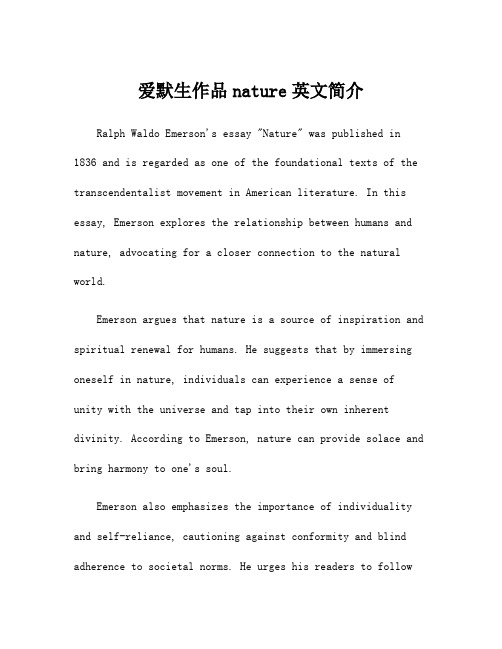
爱默生作品nature英文简介Ralph Waldo Emerson's essay "Nature" was published in 1836 and is regarded as one of the foundational texts of the transcendentalist movement in American literature. In this essay, Emerson explores the relationship between humans and nature, advocating for a closer connection to the natural world.Emerson argues that nature is a source of inspiration and spiritual renewal for humans. He suggests that by immersing oneself in nature, individuals can experience a sense ofunity with the universe and tap into their own inherent divinity. According to Emerson, nature can provide solace and bring harmony to one's soul.Emerson also emphasizes the importance of individuality and self-reliance, cautioning against conformity and blind adherence to societal norms. He urges his readers to followtheir own intuition and embrace their unique thoughts and ideas. Nature, for Emerson, serves as a direct incentive for cultivating individuality and pursuing personal growth.Furthermore, Emerson discusses the concept of "oversoul" in this essay, which refers to a universal spirit or divine essence that transcends individual existence. He suggeststhat by seeking harmony with nature, humans can tap into this higher consciousness and gain a deeper understanding oflife's purpose.Overall, "Nature" is an essay that encourages readers to embrace the beauty of the natural world, explore their own individuality, and strive for a deeper spiritual connection with the universe. It laid the groundwork for the transcendentalist movement and continues to inspire readers to this day.。
爱默生论自然英语读后感
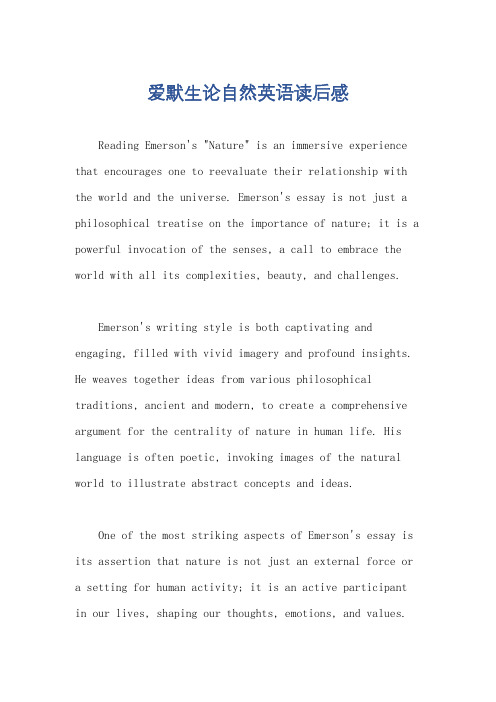
爱默生论自然英语读后感Reading Emerson's "Nature" is an immersive experience that encourages one to reevaluate their relationship with the world and the universe. Emerson's essay is not just a philosophical treatise on the importance of nature; it is a powerful invocation of the senses, a call to embrace the world with all its complexities, beauty, and challenges.Emerson's writing style is both captivating and engaging, filled with vivid imagery and profound insights. He weaves together ideas from various philosophical traditions, ancient and modern, to create a comprehensive argument for the centrality of nature in human life. His language is often poetic, invoking images of the natural world to illustrate abstract concepts and ideas.One of the most striking aspects of Emerson's essay is its assertion that nature is not just an external force or a setting for human activity; it is an active participant in our lives, shaping our thoughts, emotions, and values.He argues that we are part of nature, not separate from it, and that our understanding of ourselves and the universe is intimately tied to our understanding of the natural world.Emerson's emphasis on the interconnectedness of all things is particularly relevant in today's world, where the human impact on the environment is becoming increasingly apparent. His argument that we should view nature not as a resource to be exploited but as a partner in our existence is a powerful reminder of our responsibility towards the planet.Another significant aspect of Emerson's essay is his assertion that true knowledge and understanding come from direct experience of nature, not from books or secondhand accounts. He encourages readers to engage with the world directly, to immerse themselves in it, and to draw their own conclusions based on their own observations and experiences. This idea is particularly relevant in an era where information is easily accessible but oftensuperficial and unreliable.Emerson's writing also serves as a reminder of the importance of solitude and reflection. He argues that being alone in nature, without the distractions of society, allows us to connect with our inner selves and to gain a deeper understanding of the world. This idea isparticularly relevant in today's world, where we are constantly connected to technology and social media, and it encourages us to take time for self-reflection and personal growth.Overall, reading Emerson's "Nature" is a profound and enriching experience. It challenges our assumptions about the world and encourages us to reevaluate our relationship with nature and ourselves. Emerson's insights are both timeless and relevant, and his writing style is both engaging and thought-provoking. His essay is a powerful reminder of the importance of nature in our lives and acall to action to protect and cherish it.In conclusion, Emerson's "Nature" is a must-read for anyone interested in philosophy, environmentalism, or personal growth. It is an essay that encourages us to thinkdeeply about our place in the universe and our responsibility towards the natural world. By embracing nature and understanding our connection to it, we can gain a deeper understanding of ourselves and our purpose in the universe.。
爱默生英文简介_英文简历模板
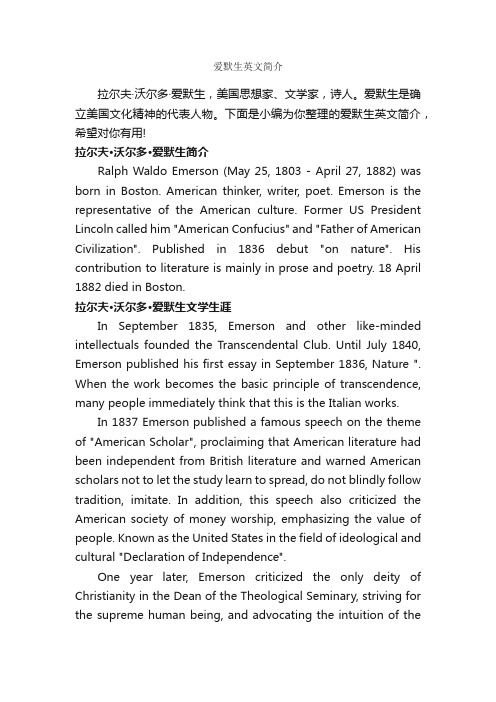
爱默生英文简介拉尔夫·沃尔多·爱默生,美国思想家、文学家,诗人。
爱默生是确立美国文化精神的代表人物。
下面是小编为你整理的爱默生英文简介,希望对你有用!拉尔夫·沃尔多·爱默生简介Ralph Waldo Emerson (May 25, 1803 - April 27, 1882) was born in Boston. American thinker, writer, poet. Emerson is the representative of the American culture. Former US President Lincoln called him "American Confucius" and "Father of American Civilization". Published in 1836 debut "on nature". His contribution to literature is mainly in prose and poetry. 18 April 1882 died in Boston.拉尔夫·沃尔多·爱默生文学生涯In September 1835, Emerson and other like-minded intellectuals founded the Transcendental Club. Until July 1840, Emerson published his first essay in September 1836, Nature ". When the work becomes the basic principle of transcendence, many people immediately think that this is the Italian works.In 1837 Emerson published a famous speech on the theme of "American Scholar", proclaiming that American literature had been independent from British literature and warned American scholars not to let the study learn to spread, do not blindly follow tradition, imitate. In addition, this speech also criticized the American society of money worship, emphasizing the value of people. Known as the United States in the field of ideological and cultural "Declaration of Independence".One year later, Emerson criticized the only deity of Christianity in the Dean of the Theological Seminary, striving for the supreme human being, and advocating the intuition of thetruth. "Believe in your own thoughts, and believe that what is right in your heart that is right for you is applicable to all ... ..." literary critics Lawrence Bull in the "Emerson Biography" said, Emerson and his doctrine, Is the most important secular religion in the United States.In 1838 he was invited to return to Harvard University Theological Seminary for the graduation ceremony. His comments immediately shocked the entire Protestant community, because he explained that when Jesus was a man, he was not God (at that time people would rather not hear such a speech). Thus, he was condemned as an atheist and poisoned the young man's mind, and faced with these criticisms he did not make any response or defense. In the following 40 years, he was no longer invited to the Harvard University speech, but in the mid-1880s, his position became a doctrine of the doctrine.ProceedingsIn 1840 Emerson was the editor of the "sundial" of the transcendentalist publication, further promoting transcendentalism. Later, he compiled his own speech into a book, which is the famous "Proceedings". The first episode of the Proceedings was published in 1841, including 12 papers such as "On Self-help", "On Spirit", "On Compensation", "On Love", "On Friendship". Three years later, the second episode of the Proceedings was also published. This book as Emerson won a great reputation, his mind is called the core of transcendentalism, he himself was known as the "American Renaissance leader" reputation.In early 1842, Emerson's eldest son of China because of suffering from scarlet fever and died. Emerson presented his grief in his two masterpieces: an elegy and his essay "Experience"(Experience). In the same year William James was born, Emerson agreed to be his godfather.Emerson became a famous speaker in New England and other countries outside the United States. When he can not attend some speeches as scheduled, Frederick Douglas will replace him. Emerson's speech has many different themes, many of his works are extracted from his speech.Emerson and Nathaniel Hawthorne and Henry David Thoreau are friends and often walk with them at Concord. Emerson inspired Thoreau's talent. Thoreau has also built a house in Walden, of Jackson County, Colorado. When Thoreau lives in Walden, Emerson offers food and hires Thoreau to finish some work. When Thoreau left Walden two years later, Emerson left because he wanted to travel, and Thoreau lived at Emerson's home.Their friendly relationship was broken by Thomson's first book, A Week on the Concord and Merrimack Rivers, when Ruth gave rude advice. This book is not very extensive design, and Emerson took him to see their agents, which allows Thoreau to bear the cost of publishing this book and the risk. Readers of this book is not much, this thoreau began to bear the debt. Finally, the two of them reconcile some of the differences, but Thoreau in private still condemned Emerson gradually deviated from his initial outlook on life, and Emerson began to Thoreau as a weary person. Emerson gave a negative evaluation of Thoreau's rhetoric in the 19th century.Emerson is an abstract and esoteric writer, but his speech still has a lot of people to listen. Emerson's work is based on his diary's observation of things, and when he was still at Harvard, he had written diary habits, and those diaries were carefullyindexed by Emerson. He writes his own experiences and ideas in his diary and brings out some meaningful messages and combines with his intensive and condensed lecture essence. Later, he revised and relented the content of the speech, so that his essay and some other works.He was a man who was regarded as one of the great performers at the time, and fascinated the audience with a low voice. He was very enthusiastic and treated with an equal attitude and valued the audience. His straightforward and uncompromising stance on the abolition of niggerism led him to object to and mock after talking about the subject. He continues to publish a radical abolition of the slaves but does not consider whether people like it. He tried to refrain from joining any open political movement or group, and was often eager to be independent, which reflected his individualist position. He often insisted not to advocate, to become a person alone on their own. In his later years, people wanted him to count the number of his writings, and he still said that his faith was "infinite individual".Emerson's early reading of the French essayist Montaigne's works, and by its great influence. He understood the personal style from these works and began to lower his trust in God. He never read Kant's work, but he read Coleridge's explanation of the German transcendentalist. This makes Emerson do not believe in the soul and God.influencesAfter Emerson died, he was buried in the Slippe Valley Cemetery in Concord, Massachusetts. In May 20xx, Emerson published the "Theological Seminary" after 168 years, Harvard University Theological Seminary announced the creation of UUA (Unitarian Universalist Association).Emerson's collection of many of the prose of "Collected Essays: First (1841) and Second (1844) Series" is considered one of the 100 masterpieces.Emerson's Proceedings praised the idea that people would trust themselves, and those who believed in themselves were representatives of all, because he perceived the universal truth. Emerson with a transcendentalist's tone, quietly narrated his view of the world, transcendentalism combined and penetrated the neo-Platonism and similar Calvin sectarian a serious moral and that can be in all natural In the discovery of God's love romantic optimism.Emerson likes to speak, face the crowd to make him excited, he said he felt a great emotion in the call, his main reputation and achievements established here. He became the leader of American transcendentalism through his own essays and speeches, and became the most important of the informal philosophers. His philosophical spirit is manifested in the remarkable view of logic and empiricism. He despises the exploration of pure theory and believes in nature, which embodies the laws of God and God.In addition to the Proceedings, Emerson's works include "Representatives", "British Characteristics", "Poems", "May Festival and Other Poems".Emerson 's prose writer, thinker, poet in one. His poetry, prose unique, pay attention to the ideological content and not too much emphasis on rhetoric gorgeous, writing like aphorism, philosophical easy to understand, persuasive, and a typical "Emerson style." Some people commented on his words: "Emerson seems to only write a sentence," his text reveals the temperament is difficult to describe: both full of autocratic andno doubt, but also has an open spirit of democracy; both aristocratic arrogance , More civilians of the direct; both clear and easy to understand, and often mixed with some kind of mysticism ... ... a person can be inserted in an article so many alarm is really amazing, those worth it in the morning Why do you read the words always inspiring, the years are not for him to cover the dust, but against the background he was sparkling.Emerson's greatest achievement in the history of American culture and literature is that he insists on the establishment of an independent national culture and literature. He is against the sudden attack, follow the footsteps. He preached the spiritual independence of the New World. Emerson's thought in its famous "American philosopher" in the further development. Emerson asked the American thinkers to "know themselves", "observe the natural", search by others long, create a new culture of the new continent, write their own books, in order to achieve their own perfection at the same time, for human progress contribution. He asked the American philosopher to be an independent thinker, not someone else's thought.He pointed out that the book contains the wisdom of the past era, but can not step by step in the past, can not regulate the moment step. He asked scholars to become a universe, rather than being pulled out of their own orbit. Some of the ideas are creative, some of the behavior is creative, some of the rhetoric is creative, these are from the mind itself feel good and the United States naturally gush out. He warned that the genius of the past could be the enemy of today's genius, and that Shakespeare could "modernize" the original style of modernity. American scholars should look forward, the eyes long in front of the head, full of hope to write their own books, each era should write theirown books.。
Nature-by-Emerson(Transcendentalism)
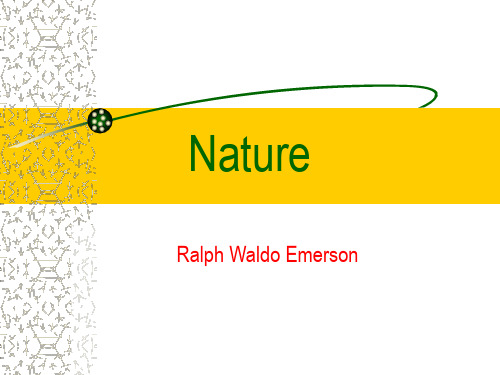
Essay entitled “Nature”
Emerson’s Ideas
1. The emphasis on Oversoul: all-pervading power for goodness, omnipresent, omnipotent; 2. The importance of Individual (Self-reliant); 3. Perception of Nature as symbol of the Oversoul.
The End
Paragraph 4
The paragraph is longer and harder.
The communion with nature makes him transcend his superficial life and get to his own nature.
Paragraph 5
一粒沙子 从一粒沙子看到一个世界, 从一朵野花看到一个天堂, 把握在你手心里的就是无限, 永恒也就消融于一个时辰。
Paragraph 3
One word again!
Michael’s Summary:
We get access to the integrity of nature through our eyes and abstract the distinct but poetical meaning out of it.
一粒沙子从一粒沙子看到一个世界从一朵野花看到一个天堂把握在你手心里的就是无限永恒也就消融于一个时辰
Nature
Ralph Waldo Emerson
爱默生诗歌中英对照
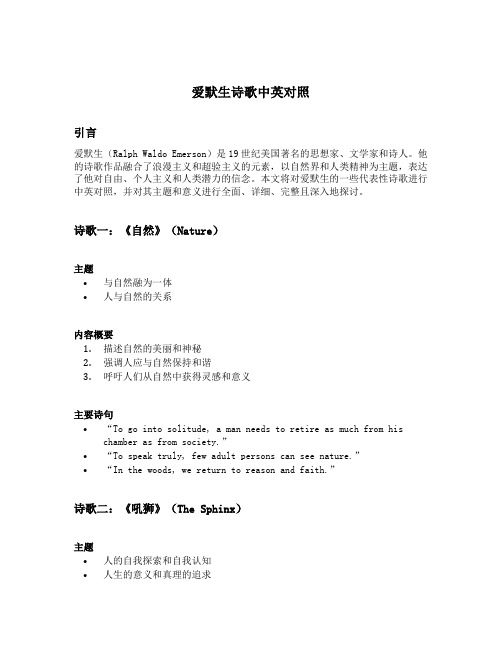
爱默生诗歌中英对照引言爱默生(Ralph Waldo Emerson)是19世纪美国著名的思想家、文学家和诗人。
他的诗歌作品融合了浪漫主义和超验主义的元素,以自然界和人类精神为主题,表达了他对自由、个人主义和人类潜力的信念。
本文将对爱默生的一些代表性诗歌进行中英对照,并对其主题和意义进行全面、详细、完整且深入地探讨。
诗歌一:《自然》(Nature)主题•与自然融为一体•人与自然的关系内容概要1.描述自然的美丽和神秘2.强调人应与自然保持和谐3.呼吁人们从自然中获得灵感和意义主要诗句•“To go into solitude, a man needs to retire as much from his chamber as from society.”•“To speak truly, few adult persons can see nature.”•“In the woods, we return to reason and faith.”诗歌二:《吼狮》(The Sphinx)主题•人的自我探索和自我认知•人生的意义和真理的追求内容概要1.以古埃及神话形象来探索人的内心世界2.推动读者思考关于生命和人类经验的深层问题3.引导人们寻找自我认知和个人成长的路径主要诗句•“The Sphinx is drowsy.”•“She has no discoverable right to existence.”•“Very unwillingly would it be wooed back to its captivity.”诗歌三:《独立宣言》(The Concord Hymn)主题•爱国主义和自由精神•个人的力量和创造力内容概要1.纪念美国独立战争中的列克星敦和康科德战役2.强调自由、勇气和牺牲精神的重要性3.鼓励个人追求和实现自己的理想和价值主要诗句•“By the rude bridge that arched the flood, their flag to April’s breeze unfurled.”•“Spirit, that made those heroes dare to die.”•“Here once the embattled farmers stood and fired the shot heard round the world.”结论通过对爱默生的诗歌进行中英对照分析,我们可以看到他对自然、人类经验、自我认知和自由精神等主题的关注。
爱默生论自然读后感英文
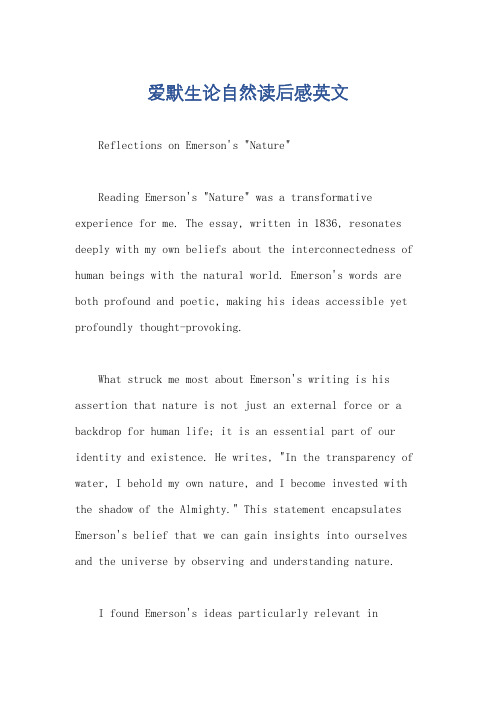
爱默生论自然读后感英文Reflections on Emerson's "Nature"Reading Emerson's "Nature" was a transformative experience for me. The essay, written in 1836, resonates deeply with my own beliefs about the interconnectedness of human beings with the natural world. Emerson's words are both profound and poetic, making his ideas accessible yet profoundly thought-provoking.What struck me most about Emerson's writing is his assertion that nature is not just an external force or a backdrop for human life; it is an essential part of our identity and existence. He writes, "In the transparency of water, I behold my own nature, and I become invested with the shadow of the Almighty." This statement encapsulates Emerson's belief that we can gain insights into ourselves and the universe by observing and understanding nature.I found Emerson's ideas particularly relevant intoday's world, where our relationship with the natural world is increasingly being eroded by anthropogenic activities like pollution, climate change, and deforestation. His emphasis on the importance of preserving nature for future generations resonates strongly with me, especially given the urgent need to act now to mitigate the worst impacts of climate change.Emerson's writing also encourages a deep and personal connection with nature. He writes about the "transparent eyeball" of nature, which allows us to see into its depths and understand its secrets. This idea encourages me to engage with nature more actively, to observe its细微之处, and to appreciate its beauty and complexity.In conclusion, Emerson's "Nature" has left me with a renewed sense of awe and respect for the natural world. His ideas about the interconnectedness of human beings and nature, and the need to preserve it for future generations, are as relevant today as they were in 1836. Reading this essay has encouraged me to engage more deeply with nature,to appreciate its beauty, and to act as a steward of the planet we all share.。
英语学习资料:爱默生经典英文诗:自然之歌
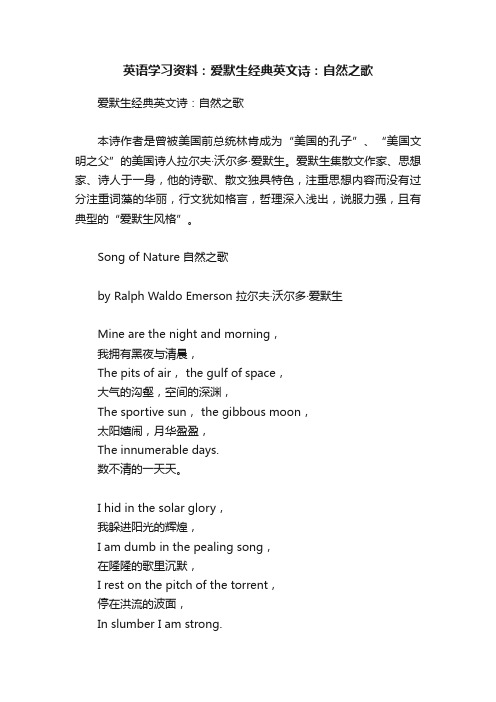
英语学习资料:爱默生经典英文诗:自然之歌爱默生经典英文诗:自然之歌本诗作者是曾被美国前总统林肯成为“美国的孔子”、“美国文明之父”的美国诗人拉尔夫·沃尔多·爱默生。
爱默生集散文作家、思想家、诗人于一身,他的诗歌、散文独具特色,注重思想内容而没有过分注重词藻的华丽,行文犹如格言,哲理深入浅出,说服力强,且有典型的“爱默生风格”。
Song of Nature 自然之歌by Ralph Waldo Emerson 拉尔夫·沃尔多·爱默生Mine are the night and morning,我拥有黑夜与清晨,The pits of air, the gulf of space,大气的沟壑,空间的深渊,The sportive sun, the gibbous moon,太阳嬉闹,月华盈盈,The innumerable days.数不清的一天天。
I hid in the solar glory,我躲进阳光的辉煌,I am dumb in the pealing song,在隆隆的歌里沉默,I rest on the pitch of the torrent,停在洪流的波面,In slumber I am strong.我在酣眠中强壮。
No numbers have counted my tallies,没有数字将我计数,No tribes my house can fill,没有部落充满我的房屋,I sit by the shining Fount of Life,坐在波光潋滟的生命泉边,And pour the deluge still;我默默将洪流倾注;And ever by delicate powers曾经倚靠精妙的力Gathering along the centuries沿着诸多的世纪采集From race on race the rarest flowers,一种接一种珍稀的花朵,My wreath shall nothing miss.我的花冠上什么都不会逃过。
爱默生《论自然》

资料范本本资料为word版本,可以直接编辑和打印,感谢您的下载爱默生《论自然》地点:__________________时间:__________________说明:本资料适用于约定双方经过谈判,协商而共同承认,共同遵守的责任与义务,仅供参考,文档可直接下载或修改,不需要的部分可直接删除,使用时请详细阅读内容Nature拉尔夫·瓦尔多·爱默生(Ralph Waldo Emerson)To speak truly, few adult persons can see nature.Most persons do not see the sun. At least they have a very superficial seeing. The sun illuminates only the eye of the man, but shines into the eye and the heart of the child.The lover of nature is he whose inward and outward senses arestill truly adjusted to each other; who has retained the spirit of infancy even into the era of manhood.His intercourse with heaven and earth, becomes part of his daily food. In the presence of nature, a wild delight runs through the man, in spite of real sorrows.Nature says, he is my creature, and maugre all his impertinent griefs, he shall be glad with me.Not the sun or the summer alone, but every hour and season yields its tribute of delight; for every hour and change corresponds to and authorizes a different state of the mind, from breathless noon to grimmest midnight.Nature is a setting that fits equally well a comic or a mourning piece.In good health, the air is a cordial of incredible virtue.Crossing a bare common, in snow puddles, at twilight, under a clouded sky, without having in my thoughts any occurrence of special good fortune,I have enjoyed a perfect exhilaration. I am glad to the brink of fear.In the woods too, a man casts off his years, as the snake his slough, and at what period soever of life, is always a child, in the woods, is perpetual youth.Within these plantations of God, a decorum and sanctity reign, a perennial festival is dressed, and the guest sees not how he should tire of them in a thousand years,In the woods, we return to reason and faith.There I feel that nothing can befall me in life, no disgrace, no calamity, (leaving me my eyes) which nature cannot repair. Standing on the bare ground, my head bathed by the blithe air, and uplifted into infinite space, all mean egotism vanishes.I become a transparent eye ball; I am nothing; I see all;the currents of the Universal Being circulate through me;I am part or particle of Gods. In the tranquil landscape, and especially in the distant line of the horizon, man beholds somewhat as beautiful as his own nature.。
论自然 爱默生 英文l 总结

• • • •
在人与自然和谐统一的基础上,爱默生呼 吁人们回归自然 人与自然的关系是相通的,你中有我,我 中有你。 一旦人远离自然,那么人就要生病,人类 社会就会产生一系列的问题。 回归自然 自然是抚慰心灵创伤和治疗社会疾病的良 药
• Thoreau 梭罗 《Walden》 • 亲身实践了自然的生活方式 • 1845年7月--1847年9月,独自居住在湖畔 自建的小木屋里,过着自给自足的生活。 • Whitman 惠特曼 • 他的诗歌颂田野、泥土、阳光、农村……
爱默生自然思想
• 爱默生认为,自然包含了两层含义。 • 第一,人生命之外的自然,指的是我们生 活在其中的那个鸟语花香、流水潺潺的自 然界。它是人生存的基础和必须依赖的对 象,具有本源性的意义。
• 第二,人生命之内的自然,指的是人生命内部的 本真自然境界,这种生命内部的自然境界源于生 命之外的那个自然界。 • 由于外部自然界充满着真善美,所以人心内部也 呈现着这种状态,一旦人心中充满了欺诈、虚伪 和庸俗等特点,那就是由于远离外部自然而导致 • 如果要消解疾病和痛苦,只有返回到自然状态, 才能获得健康生活。
浮冰上的企鹅
ecological crisis rich in material barren in spirit social problems
Why?
we are far from nature the relationship between man and nature is off-balanced we are not in harmony with nature any more
爱默生自然思想的现实意义
爱默生从生存层面强调人与自然的整体统一性, 把人视为自然的一部分,而且还把人与自然的关 系统一到精神领域中去。 • 解构了西方传统思维中人与自然二元对立的状态 • 笛卡儿:“借助实践使自己成为自然的统治者” • 洛克:“对自然界的否定就是通往幸福之路” • 西方文化的主流基督教更是蔑视自然,把自然视 为上帝和人的奴仆 • 近代工业革命以来,随着科学技术的发展,愈加 独断的技术理性和工具理性更加深了人自关系的 分离
论自然爱默生自然英文PPT课件
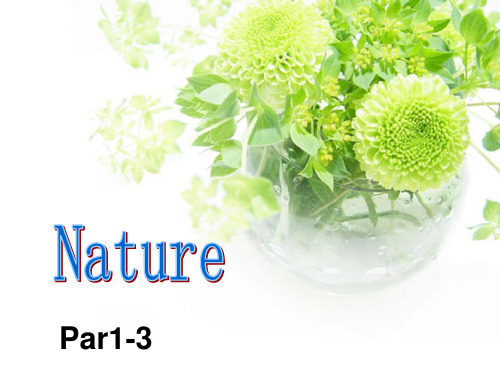
sthpeiristuymalbroelfuogfespirit (19th c)
In enumerating the values of nature and casting up their sum, I shall use the word in both senses; -in its common and in its philosophical import. In inquiries so general as our present one, the inaccuracy is not material; no confusion of thought will occur. Nature, in the common sense, refers to essences unchanged by man; space, the air, the river, the leaf. Art is applied to the mixture of his will with the same things, as in a house, a canal, a statue, a picture.
爱默s生pir的itu自al r然efu观ge
自然
精神
美
爱默生心中和笔下的自然就不是单纯的自 然景物的再现,而是有条件的、在一定范围内 的、富有特色的自然景物和上帝精神的象征。 在这三位一体所构成的框架中,任何一方都不 可缺少。因此,爱默生笔下的自然带有强烈的
象征色彩和主观色彩。
To go into solistupdieri,tauamlarnenfuegedes to retire as
spiritual refuge (early 17th c)
the shadow of the spiritual world (18th c)
论自然 爱默生 自然1-3 英文

spiritual refuge
Solitude”独处,隐逸” chamber“居室” retire“(书)遁世,远离” would“愿意,想要”
sublime“崇高的” transparent“透明的” perpetual“永恒的” this design“造物主把空气涉及成透明的”
spiritual refuge
倘若一个人想要做到离群索居,他不仅需要退 出社会,而且还要走出自己的房子。当我在读书或 写作的时候,虽然没人和我在一块儿,但是我并不 会感到孤独。然而,倘若你想追求一份孤独的感觉, 那么你就抬头看看星星。那从遥远天国射来的光线, 将会把你和周围的琐事隔离开来。我们可以设想, 人们能在这天体中间感到崇高的永久存在,这种做 法可以使得现象变得晴晰透明。
the symbol of spirit (19th c) spiritual refuge
In enumerating the values of nature and casting up their sum, I shall use the word in both senses; -- in its common and in its philosophical import. In inquiries so general as our present one, the inaccuracy is not material; no confusion of thought will occur. Nature, in the common sense, refers to essences unchanged by man; space, the air, the river, the leaf. Art is applied to the mixture of his will with the same things, as in a house, a canal, a statue, a picture. —Introduction
自然相关的英文名著
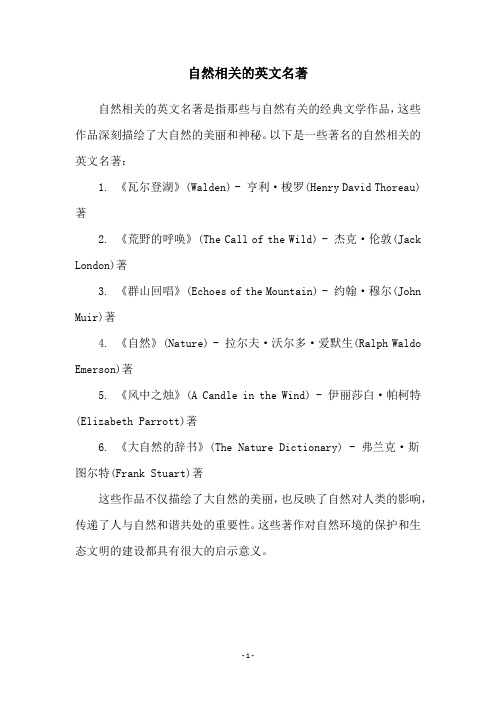
自然相关的英文名著
自然相关的英文名著是指那些与自然有关的经典文学作品,这些作品深刻描绘了大自然的美丽和神秘。
以下是一些著名的自然相关的英文名著:
1. 《瓦尔登湖》(Walden) - 亨利·梭罗(Henry David Thoreau)著
2. 《荒野的呼唤》(The Call of the Wild) - 杰克·伦敦(Jack London)著
3. 《群山回唱》(Echoes of the Mountain) - 约翰·穆尔(John Muir)著
4. 《自然》(Nature) - 拉尔夫·沃尔多·爱默生(Ralph Waldo Emerson)著
5. 《风中之烛》(A Candle in the Wind) - 伊丽莎白·帕柯特(Elizabeth Parrott)著
6. 《大自然的辞书》(The Nature Dictionary) - 弗兰克·斯
图尔特(Frank Stuart)著
这些作品不仅描绘了大自然的美丽,也反映了自然对人类的影响,传递了人与自然和谐共处的重要性。
这些著作对自然环境的保护和生态文明的建设都具有很大的启示意义。
- 1 -。
爱默生《论自然》

The third part(5-6)
• Different environment and mood makes different relationship between people and the nature.
Nature
To go into solitude, a man needs to retire as much from his chamber as from society. I am not solitary whilst I read and write, though nobody is with me. But if a man would be alone, let him look at the stars. The rays that come from those heavenly worlds will separate between him and what he touches.
Nature
In his book, we can feel that he regarded nature as the purest, and the most sanctifying moral influence on man, and advocated a direct intuition of a spiritual and immanent God in nature. Philosophically considered, Emerson thought that the universe is composed of Nature and the Soul. In addition, he paid much attention to the status and role of human beings as well.
- 1、下载文档前请自行甄别文档内容的完整性,平台不提供额外的编辑、内容补充、找答案等附加服务。
- 2、"仅部分预览"的文档,不可在线预览部分如存在完整性等问题,可反馈申请退款(可完整预览的文档不适用该条件!)。
- 3、如文档侵犯您的权益,请联系客服反馈,我们会尽快为您处理(人工客服工作时间:9:00-18:30)。
N A T U R EThe rounded world is fair to see,Nine times folded in mystery:Though baffled seers cannot impartThe secret of its laboring heart,Throb thine with Nature's throbbing breast,And all is clear from east to west.Spirit that lurks each form withinBeckons to spirit of its kin;Self-kindled every atom glows,And hints the future which it owes.Essay VI _Nature_There are days which occur in this climate, at almost any season of the year, wherein the world reaches its perfection, when the air, the heavenly bodies, and the earth, make a harmony, as if nature would indulge her offspring; when, in these bleak upper sides of the planet, nothing is to desire that we have heard of the happiest latitudes, and we bask in the shining hours of Florida and Cuba; when everything that has life gives sign of satisfaction, and the cattle that lie on the ground seem to have great and tranquil thoughts. These halcyons may be looked for with a little more assurance in that pure October weather, which we distinguish by the name of the Indian Summer. The day, immeasurably long, sleeps over the broad hills and warm wide fields. To have lived through all its sunny hours, seems longevity enough. The solitary places do not seem quite lonely. At the gates of the forest, the surprised man of the world is forced to leave his city estimates of great and small, wise and foolish. The knapsack of custom falls off his back with the first step he makes into these precincts. Here is sanctity which shames our religions, and reality which discredits our heroes. Here we find nature to be the circumstance which dwarfs every other circumstance, and judges like a god all men that come to her. We have crept out of our close and crowded houses into the night and morning, and we see what majestic beauties daily wrap us in their bosom. How willingly we would escape the barriers which render them comparatively impotent, escape the sophistication and second thought, and suffer nature to intrance us. The tempered light of the woods is like a perpetual morning, and is stimulating and heroic. The anciently reported spells of these places creep on us. The stems of pines, hemlocks, and oaks, almost gleam like iron on the excited eye. The incommunicable trees begin to persuade us to live with them, and quit our life of solemn trifles. Here no history, or church, or state, is interpolated on the divine sky and the immortal year. How easily we might walk onward into the opening landscape, absorbed by new pictures, and by thoughts fast succeeding each other, until by degrees the recollection of home was crowded out of the mind, all memory obliterated by the tyranny of the present, and we were led in triumph by nature.These enchantments are medicinal, they sober and heal us. These are plain pleasures, kindly and native to us. We come to our own, and make friends with matter, which the ambitious chatter of the schools would persuade us to despise. We never can part with it; the mind loves its old home: as water to our thirst, so is the rock, the ground, to our eyes, and hands, and feet. It is firm water: it is cold flame: what health, what affinity! Ever an old friend, ever like a dear friend and brother, when we chat affectedly with strangers, comes in this honest face, and takes a grave liberty with us, and shames us out of our nonsense. Cities give not the human senses room enough. We go out daily and nightly to feed the eyes on the horizon, and require so much scope, just as we need water for our bath. There are all degrees of natural influence, from these quarantine powers of nature, up to her dearest and gravest ministrations to the imagination and the soul. There is the bucket of cold water from the spring, the wood-fire to which the chilled traveller rushes for safety, -- and there is the sublime moral of autumn and of noon. We nestle in nature, and draw our living as parasites from her roots and grains, and we receive glances from the heavenly bodies, which call us to solitude, and foretell the remotest future. The blue zenith is the point in which romance and reality meet. I think, if we should be rapt away into all that we dream of heaven, and should converse with Gabriel and Uriel, the upper sky would be all that would remain of our furniture.It seems as if the day was not wholly profane, in which we have given heed to some natural object. The fall of snowflakes in a still air, preserving to each crystal its perfect form; the blowing of sleet over a wide sheet of water, and over plains, the waving rye-field, the mimic waving of acres of houstonia, whose innumerable florets whiten and ripple before the eye; the reflections of trees and flowers in glassy lakes; the musical steaming odorous south wind, which converts all trees to windharps; the crackling and spurting of hemlock in the flames; or of pine logs, which yield glory to the walls and faces in the sittingroom, -- these are the music and pictures of the most ancient religion. My house stands in low land, with limited outlook, and on the skirt of the village. But I go with my friend to the shore of our little river, and with one stroke of the paddle, I leave the village politics and personalities, yes, and the world of villages and personalities behind, and pass into a delicate realm of sunset and moonlight, too bright almost for spotted man to enter without noviciate and probation. We penetrate bodily this incredible beauty; we dip our hands in this painted element: our eyes are bathed in these lights and forms. A holiday, a villeggiatura, a royal revel, the proudest, most heart-rejoicing festival that valor and beauty, power and taste, ever decked and enjoyed, establishes itself on the instant. These sunset clouds, these delicately emerging stars, with their private and ineffable glances, signify it and proffer it. I am taught the poorness of our invention, the ugliness of towns and palaces. Art and luxury have early learned that they must work as enhancement and sequel to this original beauty. I am over-instructed for my return. Henceforth I shall be hard to please. I cannot go back to toys. I am grown expensive and sophisticated. I can no longer live without elegance: but a countryman shall be my master of revels. He who knows the most, he who knows what sweets and virtues are in the ground, the waters, the plants, the heavens, and how to come at these enchantments, is the rich and royal man. Only as far as the masters of the world havecalled in nature to their aid, can they reach the height of magnificence. This is the meaning of their hanging-gardens, villas, garden-houses, islands, parks, and preserves, to back their faulty personality with these strong accessories. I do not wonder that the landed interest should be invincible in the state with these dangerous auxiliaries. These bribe and invite; not kings, not palaces, not men, not women, but these tender and poetic stars, eloquent of secret promises. We heard what the rich man said, we knew of his villa, his grove, his wine, and his company, but the provocation and point of the invitation came out of these beguiling stars. In their soft glances, I see what men strove to realize in some Versailles, or Paphos, or Ctesiphon. Indeed, it is the magical lights of the horizon, and the blue sky for the background, which save all our works of art, which were otherwise bawbles. When the rich tax the poor with servility and obsequiousness, they should consider the effect of men reputed to be the possessors of nature, on imaginative minds. Ah! if the rich were rich as the poor fancy riches! A boy hears a military band play on the field at night, and he has kings and queens, and famous chivalry palpably before him. He hears the echoes of a horn in a hill country, in the Notch Mountains, for example, which converts the mountains into an Aeolian harp, and this supernatural tiralira restores to him the Dorian mythology, Apollo, Diana, and all divine hunters and huntresses. Can a musical note be so lofty, so haughtily beautiful! To the poor young poet, thus fabulous is his picture of society; he is loyal; he respects the rich; they are rich for the sake of his imagination; how poor his fancy would be, if they were not rich! That they have some high-fenced grove, which they call a park; that they live in larger and better-garnished saloons than he has visited, and go in coaches, keeping only the society of the elegant, to watering-places, and to distant cities, are the groundwork from which he has delineated estates of romance, compared with which their actual possessions are shanties and paddocks. The muse herself betrays her son, and enhances the gifts of wealth and well-born beauty, by a radiation out of the air, and clouds, and forests that skirt the road, -- a certain haughty favor, as if from patrician genii to patricians, a kind of aristocracy in nature, a prince of the power of the air.The moral sensibility which makes Edens and Tempes so easily, may not be always found, but the material landscape is never far off. We can find these enchantments without visiting the Como Lake, or the Madeira Islands. We exaggerate the praises of local scenery. In every landscape, the point of astonishment is the meeting of the sky and the earth, and that is seen from the first hillock as well as from the top of the Alleghanies. The stars at night stoop down over the brownest, homeliest common, with all the spiritual magnificence which they shed on the Campagna, or on the marble deserts of Egypt. The uprolled clouds and the colors of morning and evening, will transfigure maples and alders. The difference between landscape and landscape is small, but there is great difference in the beholders. There is nothing so wonderful in any particular landscape, as the necessity of being beautiful under which every landscape lies. Nature cannot be surprised in undress. Beauty breaks in everywhere.But it is very easy to outrun the sympathy of readers on this topic, which schoolmen called _natura naturata_, or nature passive. One can hardly speak directly of it withoutexcess. It is as easy to broach in mixed companies what is called "the subject of religion."A susceptible person does not like to indulge his tastes in this kind, without the apology of some trivial necessity: he goes to see a wood-lot, or to look at the crops, or to fetch a plant or a mineral from a remote locality, or he carries a fowling piece, or a fishing-rod.I suppose this shame must have a good reason. A dilettantism in nature is barren and unworthy. The fop of fields is no better than his brother of Broadway. Men are naturally hunters and inquisitive of wood-craft, and I suppose that such a gazetteer as wood-cutters and Indians should furnish facts for, would take place in the most sumptuous drawingrooms of all the "Wreaths" and "Flora's chaplets" of the bookshops; yet ordinarily, whether we are too clumsy for so subtle a topic, or from whatever cause, as soon as men begin to write on nature, they fall into euphuism. Frivolity is a most unfit tribute to Pan, who ought to be represented in the mythology as the most continent of gods. I would not be frivolous before the admirable reserve and prudence of time, yet I cannot renounce the right of returning often to this old topic. The multitude of false churches accredits the true religion. Literature, poetry, science, are the homage of man to this unfathomed secret, concerning which no sane man can affect an indifference or incuriosity. Nature is loved by what is best in us. It is loved as the city of God, although, or rather because there is no citizen. The sunset is unlike anything that is underneath it: it wants men. And the beauty of nature must always seem unreal and mocking, until the landscape has human figures, that are as good as itself. If there were good men, there would never be this rapture in nature. If the king is in the palace, nobody looks at the walls. It is when he is gone, and the house is filled with grooms and gazers, that we turn from the people, to find relief in the majestic men that are suggested by the pictures and the architecture. The critics who complain of the sickly separation of the beauty of nature from the thing to be done, must consider that our hunting of the picturesque is inseparable from our protest against false society. Man is fallen; nature is erect, and serves as a differential thermometer, detecting the presence or absence of the divine sentiment in man. By fault of our dulness and selfishness, we are looking up to nature, but when we are convalescent, nature will look up to us. We see the foaming brook with compunction: if our own life flowed with the right energy, we should shame the brook. The stream of zeal sparkles with real fire, and not with reflex rays of sun and moon. Nature may be as selfishly studied as trade. Astronomy to the selfish becomes astrology; psychology, mesmerism (with intent to show where our spoons are gone); and anatomy and physiology, become phrenology and palmistry.But taking timely warning, and leaving many things unsaid on this topic, let us not longer omit our homage to the Efficient Nature, _natura naturans_, the quick cause, before which all forms flee as the driven snows, itself secret, its works driven before it in flocks and multitudes, (as the ancient represented nature by Proteus, a shepherd,) and in undescribable variety. It publishes itself in creatures, reaching from particles and spicula, through transformation on transformation to the highest symmetries, arriving at consummate results without a shock or a leap. A little heat, that is, a little motion, is all that differences the bald, dazzling white, and deadly cold poles of the earth from the prolific tropical climates. All changes pass without violence, by reason of the twocardinal conditions of boundless space and boundless time. Geology has initiated us into the secularity of nature, and taught us to disuse our dame-school measures, and exchange our Mosaic and Ptolemaic schemes for her large style. We knew nothing rightly, forwant of perspective. Now we learn what patient periods must round themselves before the rock is formed, then before the rock is broken, and the first lichen race has disintegrated the thinnest external plate into soil, and opened the door for the remote Flora, Fauna, Ceres, and Pomona, to come in. How far off yet is the trilobite! How far the quadruped! how inconceivably remote is man! All duly arrive, and then race after race of men. It is a long way from granite to the oyster; farther yet to Plato, and the preaching of the immortality of the soul. Yet all must come, as surely as the first atom has two sides.Motion or change, and identity or rest, are the first and second secrets of nature: Motion and Rest. The whole code of her laws may be written on the thumbnail, or the signet of a ring. The whirling bubble on the surface of a brook, admits us to the secret of the mechanics of the sky. Every shell on the beach is a key to it. A little water made to rotate in a cup explains the formation of the simpler shells; the addition of matter from year to year, arrives at last at the most complex forms; and yet so poor is nature with all her craft, that, from the beginning to the end of the universe, she has but one stuff, -- but one stuff with its two ends, to serve up all her dream-like variety. Compound it how she will, star, sand, fire, water, tree, man, it is still one stuff, and betrays the same properties.Nature is always consistent, though she feigns to contravene her own laws. She keeps her laws, and seems to transcend them. She arms and equips an animal to find its place and living in the earth, and, at the same time, she arms and equips another animal to destroy it. Space exists to divide creatures; but by clothing the sides of a bird with a few feathers, she gives him a petty omnipresence. The direction is forever onward, but the artist still goes back for materials, and begins again with the first elements on the most advanced stage: otherwise, all goes to ruin. If we look at her work, we seem to catch a glance of a system in transition. Plants are the young of the world, vessels of health and vigor; but they grope ever upward towards consciousness; the trees are imperfect men, and seem to bemoan their imprisonment, rooted in the ground. The animal is the novice and probationer of a more advanced order. The men, though young, having tasted the first drop from the cup of thought, are already dissipated: the maples and ferns are still uncorrupt; yet no doubt, when they come to consciousness, they too will curse and swear. Flowers so strictly belong to youth, that we adult men soon come to feel, that their beautiful generations concern not us: we have had our day; now let the children have theirs. The flowers jilt us, and we are old bachelors with our ridiculous tenderness.Things are so strictly related, that according to the skill of the eye, from any one object the parts and properties of any other may be predicted. If we had eyes to see it, a bit of stone from the city wall would certify us of the necessity that man must exist, as readily as the city. That identity makes us all one, and reduces to nothing great intervals on our customary scale. We talk of deviations from natural life, as if artificial life were not also natural. The smoothest curled courtier in the boudoirs of a palace has an animalnature, rude and aboriginal as a white bear, omnipotent to its own ends, and is directly related, there amid essences and billetsdoux, to Himmaleh mountain-chains, and the axis of the globe. If we consider how much we are nature's, we need not be superstitious about towns, as if that terrific or benefic force did not find us there also, and fashion cities. Nature who made the mason, made the house. We may easily hear too much of rural influences. The cool disengaged air of natural objects, makes them enviable to us, chafed and irritable creatures with red faces, and we think we shall be as grand as they, if we camp out and eat roots; but let us be men instead of woodchucks, and the oak and the elm shall gladly serve us, though we sit in chairs of ivory on carpets of silk.This guiding identity runs through all the surprises and contrasts of the piece, and characterizes every law. Man carries the world in his head, the whole astronomy and chemistry suspended in a thought. Because the history of nature is charactered in his brain, therefore is he the prophet and discoverer of her secrets. Every known fact in natural science was divined by the presentiment of somebody, before it was actually verified. A man does not tie his shoe without recognising laws which bind the farthest regions of nature: moon, plant, gas, crystal, are concrete geometry and numbers. Common sense knows its own, and recognises the fact at first sight in chemical experiment. The common sense of Franklin, Dalton, Davy, and Black, is the same common sense which made the arrangements which now it discovers.If the identity expresses organized rest, the counter action runs also into organization. The astronomers said, `Give us matter, and a little motion, and we will construct the universe. It is not enough that we should have matter, we must also have a single impulse, one shove to launch the mass, and generate the harmony of the centrifugal and centripetal forces. Once heave the ball from the hand, and we can show how all this mighty order grew.' -- `A very unreasonable postulate,' said the metaphysicians, `and a plain begging of the question. Could you not prevail to know the genesis of projection, as well as the continuation of it?' Nature, meanwhile, had not waited for the discussion, but, right or wrong, bestowed the impulse, and the balls rolled. It was no great affair, a mere push, but the astronomers were right in making much of it, for there is no end to the consequences of the act. That famous aboriginal push propagates itself through all the balls of the system, and through every atom of every ball, through all the races of creatures, and through the history and performances of every individual. Exaggeration is in the course of things. Nature sends no creature, no man into the world, without adding a small excess of his proper quality. Given the planet, it is still necessary to add the impulse; so, to every creature nature added a little violence of direction in its proper path, a shove to put it on its way; in every instance, a slight generosity, a drop too much. Without electricity the air would rot, and without this violence of direction, which men and women have, without a spice of bigot and fanatic, no excitement, no efficiency. We aim above the mark, to hit the mark. Every act hath some falsehood of exaggeration in it. And when now and then comes along some sad, sharp-eyed man, who sees how paltry a game is played, and refuses to play, but blabs the secret; -- how then? is the bird flown? O no, the wary Nature sends a new troop of fairer forms, of lordlier youths, with a little more excess ofdirection to hold themfast to their several aim; makes them a little wrongheaded in that direction in which they are rightest, and on goes the game again with new whirl, for a generation or two more. The child with his sweet pranks, the fool of his senses, commanded by every sight and sound, without any power to compare and rank his sensations, abandoned to a whistle or a painted chip, to a lead dragoon, or a gingerbread-dog, individualizing everything, generalizing nothing, delighted with every new thing, lies down at night overpowered by the fatigue, which this day of continual pretty madness has incurred. But Nature has answered her purpose with the curly, dimpled lunatic. She has tasked every faculty, and has secured the symmetrical growth of the bodily frame, by all these attitudes and exertions, -- an end of the first importance, which could not be trusted to any care less perfect than her own. This glitter, this opaline lustre plays round the top of every toy to his eye, to ensure his fidelity, and he is deceived to his good. We are made alive and kept alive by the same arts. Let the stoics say what they please, we do not eat for the good of living, but because the meat is savory and the appetite is keen. The vegetable life does not content itself with casting from the flower or the tree a single seed, but it fills the air and earth with a prodigality of seeds, that, if thousands perish, thousands may plant themselves, that hundreds may come up, that tens may live to maturity, that, at least, one may replace the parent. All things betray the same calculated profusion. The excess of fear with which the animal frame is hedged round, shrinking from cold, starting at sight of a snake, or at a sudden noise, protects us, through a multitude of groundless alarms, from some one real danger at last. The lover seeks in marriage his private felicity and perfection, with no prospective end; and nature hides in his happiness her own end, namely, progeny, or the perpetuity of the race.But the craft with which the world is made, runs also into the mind and character of men. No man is quite sane; each has a vein of folly in his composition, a slight determination of blood to the head, to make sure of holding him hard to some one point which nature had taken to heart. Great causes are never tried on their merits; but the cause is reduced to particulars to suit the size of the partizans, and the contention is ever hottest on minor matters. Not less remarkable is the overfaith of each man in the importance of what he has to do or say. The poet, the prophet, has a higher value for what he utters than any hearer, and therefore it gets spoken. The strong, self-complacent Luther declares with an emphasis, not to be mistaken, that "God himself cannot do without wise men." Jacob Behmen and George Fox betray their egotism in the pertinacity of their controversial tracts, and James Naylor once suffered himself to be worshipped as the Christ. Each prophet comes presently to identify himself with his thought, and to esteem his hat and shoes sacred. However this may discredit such persons with the judicious, it helps them with the people, as it gives heat, pungency, and publicity to their words. A similar experience is not infrequent in private life. Each young and ardent person writes a diary, in which, when the hours of prayer and penitence arrive, he inscribes his soul. The pages thus written are, to him, burning and fragrant: he reads them on his knees by midnight and by the morning star; he wets them with his tears: they are sacred; too good for the world, and hardly yet to be shown to the dearest friend. This is the man-child that is born to the soul, and her life still circulates in the babe. The umbilical cord has not yetbeen cut. After some time has elapsed, he begins to wish to admit his friend to this hallowed experience, and with hesitation, yet with firmness, exposes the pages to his eye. Will they not burn his eyes? The friend coldly turns them over, and passes from the writing to conversation, with easy transition, which strikes the other party with astonishment and vexation. He cannot suspect the writing itself. Days and nights of fervid life, of communion with angels of darkness and of light, have engraved their shadowy characters on that tear-stained book. He suspects the intelligence or the heart of his friend. Is there then no friend? He cannot yet credit that one may have impressive experience, and yet may not know how to put his private fact into literature; and perhaps the discovery that wisdom has other tongues and ministers than we, that though we should hold our peace, the truth would not the less be spoken, might check injuriously the flames of our zeal. A man can only speak, so long as he does not feel his speech to be partial and inadequate. It is partial, but he does not see it to be so, whilst he utters it. As soon as he is released from the instinctive and particular, and sees its partiality, he shuts his mouth in disgust. For, no man can write anything, who does not think that what he writes is for the time the history of the world; or do anything well, who does not esteem his work to be of importance. My work may be of none, but I must not think it of none, or I shall not do it with impunity.In like manner, there is throughout nature something mocking, something that leads us on and on, but arrives nowhere, keeps no faith with us. All promise outruns the performance. We live in a system of approximations. Every end is prospective of some other end, which is also temporary; a round and final success nowhere. We are encamped in nature, not domesticated. Hunger and thirst lead us on to eat and to drink; but bread and wine, mix and cook them how you will, leave us hungry and thirsty, after the stomach is full. It is the same with all our arts and performances. Our music, our poetry, our language itself are not satisfactions, but suggestions. The hunger for wealth, which reduces the planet to a garden, fools the eager pursuer. What is the end sought? Plainly to secure the ends of good sense and beauty, from the intrusion of deformity or vulgarity of any kind. But what an operose method! What a train of means to secure a little conversation! This palace of brick and stone, these servants, this kitchen, these stables, horses and equipage, this bank-stock, and file of mortgages; trade to all the world, country-house and cottage by the waterside, all for a little conversation, high, clear, and spiritual! Could it not be had as well by beggars on the highway? No, all these things came from successive efforts of these beggars to remove friction from the wheels of life, and give opportunity. Conversation, character, were the avowed ends; wealth was good as it appeased the animal cravings, cured the smoky chimney, silenced the creaking door, brought friends together in a warm and quiet room, and kept the children and the dinner-table in a different apartment. Thought, virtue, beauty, were the ends; but it was known that men of thought and virtue sometimes had the headache, or wet feet, or could lose good time whilst the room was getting warm in winter days. Unluckily, in the exertions necessary to remove these inconveniences, the main attention has been diverted to this object; the old aims have been lost sight of, and to remove friction has come to be the end. That is the ridicule of rich men, and Boston, London, Vienna, and now the。
